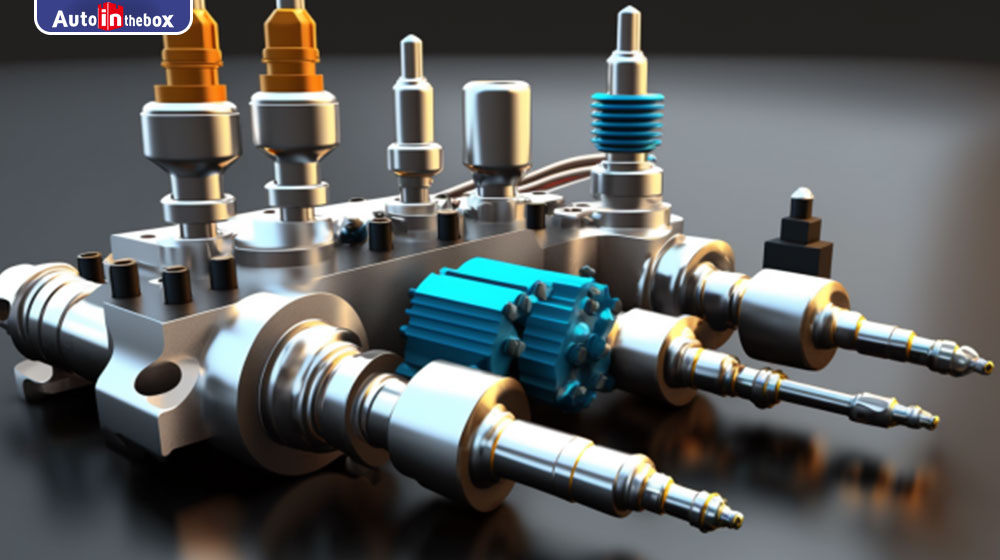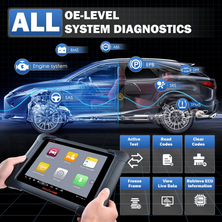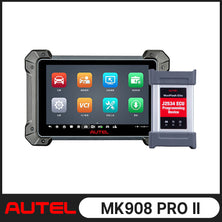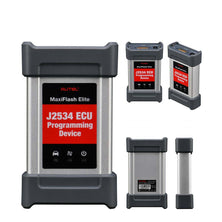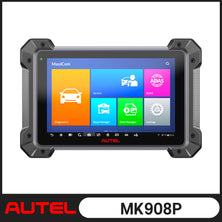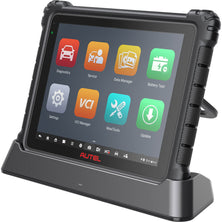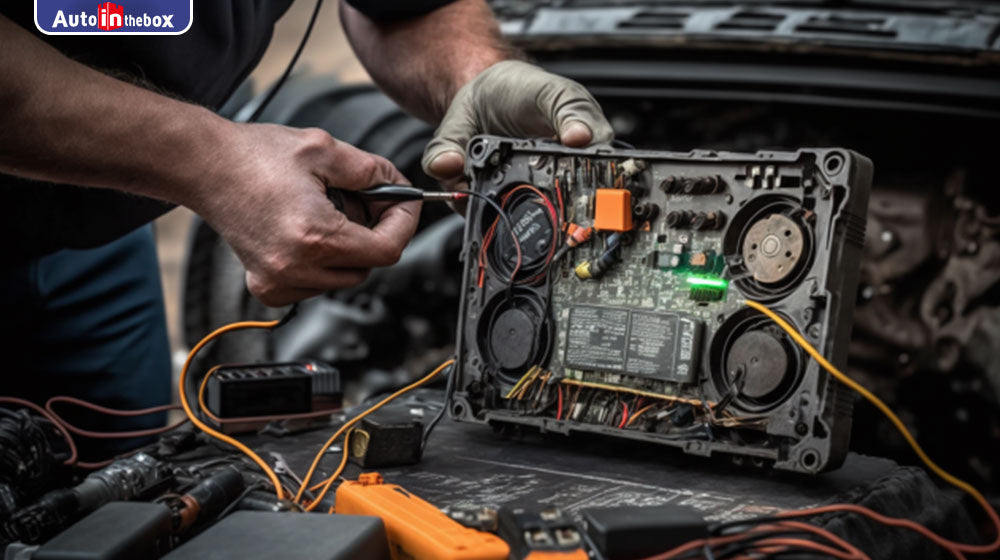
Can a faulty ECU be repaired? How Can I Tell If It's Faulty?
ECU stands for Electronic Control Unit, a vital component of a vehicle's electronic control system. ECU malfunction refers to a situation where the ECU is not functioning correctly, resulting in various vehicle performance and safety problems.
Recommended 2023 top car diagnostic tool: Autel MK908P,Autel Elite,Autel Elite II ,Autel MK908P II,Launch PADVII
Causes/Symptoms/Effects of ECU Malfunction
There are several potential causes of ECU (Engine Control Unit) failure, including:
- Electrical problems: Any issues with the power supply or wiring to the ECU can cause it to fail. This could be due to a short circuit, a broken wire, or a faulty connection.
- Overheating: The ECU can overheat if it is placed in a location that gets too hot or has a problem with the cooling system. Overheating can cause damage to the internal components of the ECU.
- Water damage: If the ECU gets wet, it can cause damage to the internal circuitry. This can be caused by driving through deep water or by a leak in the car's bodywork.
- Vibration: If the ECU is not securely mounted or there is excessive vibration in the car, it can cause damage to the internal components of the ECU.
- Software issues: The software that runs on the ECU can sometimes become corrupted or damaged. This can cause the ECU to fail or operate incorrectly.
- Age and wear: Like any electronic device, the ECU can wear out over time. Components can fail, connections can become loose, and internal circuits can degrade.
- Improper installation or repair: If the ECU is not installed correctly, or if it is repaired by someone not qualified, it can cause damage to the ECU or other components of the car.
These are just a few of the potential causes of ECU failure. Proper maintenance, installation, and repair can help to prevent many of these issues.
Several symptoms may indicate ECU (Engine Control Unit) failure, including:
- Engine misfiring: If the ECU fails to regulate the engine's fuel and air mixture properly, it can cause the engine to misfire or run rough.
- Loss of power: A faulty ECU can cause the engine to lose control or stall, making it difficult or impossible to drive the VehicleVehicle.
- Check engine light: If the ECU detects a problem with the engine or emissions system, it will trigger the check engine light to come on.
- Poor fuel economy: If the ECU appropriately regulates the fuel system, it can prevent the VehicleVehicle from using more fuel than usual.
- Ignition problems: A faulty ECU can also cause problems with the ignition system, making it difficult or impossible to start the VehicleVehicle.
- Transmission issues: In some cases, a faulty ECU can also cause problems with the transmission, such as erratic shifting or failure to shift gears.
- Overheating: If the ECU is malfunctioning, it can cause the engine to overheat or run at a higher temperature than usual.
These are just a few of the symptoms that may indicate ECU failure. If any of these issues are present, it is essential to have the VehicleVehicle inspected by a qualified mechanic to diagnose the problem and determine the appropriate course of action.
The impact of ECU (Engine Control Unit) failure can vary significantly. Some of the most common effects of ECU failure include the following:
- Reduced engine performance: A malfunctioning ECU can cause the engine to operate improperly, reducing power, acceleration, and overall performance.
- Increased emissions: ECU failure can cause the engine to produce higher levels of harmful emissions, leading to environmental damage and potentially causing the VehicleVehicle to fail emissions tests.
- Poor fuel economy: If the ECU is not functioning properly, it may not regulate the fuel system correctly, causing the VehicleVehicle to use more fuel than necessary and decreasing fuel efficiency.
- Transmission problems: The ECU is responsible for regulating the transmission so that a malfunctioning ECU can cause problems, such as erratic shifting or difficulty changing gears.
- Electrical issues: The ECU is a complex electronic component, and its failure can cause problems with other electrical systems in the VehicleVehicle, such as the starter, alternator, or battery.
- Check engine light: ECU failure can trigger the check engine light, indicating a problem with the engine or emissions system.
- Safety risks: ECU failure can cause safety risks, such as loss of power, erratic engine performance, and transmission issues, which can increase the risk of accidents.
These are just a few of the potential effects of ECU failure. If any of these issues are present, it is essential to have the VehicleVehicle inspected by a qualified mechanic to diagnose the problem and determine the appropriate course of action.
How to detect and repair ECU Faults?
To diagnose and repair ECU (Engine Control Unit) faults, the following steps can be taken:
- Connect a diagnostic scanner to the Vehicle's OBD-II (On-Board Diagnostics) port. This will allow you to retrieve any fault codes stored in the ECU.
- Read the fault codes and interpret them. Different codes represent different problems, so it's essential to identify which code(s) are present and what they mean.
- Use the diagnostic scanner to perform live data monitoring. This will allow you to see how the ECU functions in real time and identify abnormal readings or behavior.
- Inspect the wiring and connectors associated with the ECU. Loose, damaged, or corroded connections can cause communication errors and other issues.
- Test the sensors and actuators associated with the ECU. A malfunctioning sensor or actuator can cause the ECU to behave incorrectly.
If necessary, replace the ECU. This is typically a last resort after all other troubleshooting steps have been exhausted.
Once the issue has been resolved, clear any fault codes from the ECU's memory and test the system again to ensure everything functions properly.
How to prevent ECU Faults?
To prevent ECU (Engine Control Unit) malfunctions, the following measures can be taken:
- Regular Maintenance: Ensure that the Vehicle Vehicle is maintained regularly and that the ECU is checked for routine maintenance.
- Keep the VehicleVehicle Clean: Dirt, debris, and moisture can cause damage to the ECU. Therefore, keeping the VehicleVehicle clean and ensuring that the ECU is protected from these elements can prevent malfunctions.
- Check Battery Health: A weak or faulty battery can cause voltage fluctuations that may damage the ECU. Hence, checking the battery's health regularly and replacing it if necessary is essential.
- Use High-Quality Fuel: Poor quality fuel can cause damage to the ECU and other components of the Vehicle'sVehicle's engine. Using high-quality energy and avoiding contaminated fuel can help prevent ECU malfunctions.
- Drive Carefully: Abrupt acceleration, sudden stops, and harsh driving can cause stress on the Vehicle'sVehicle's engine and ECU. Therefore, driving carefully and avoiding extreme driving conditions can help prevent ECU malfunctions.
- Avoid Water Damage: Water damage can cause significant damage to the ECU. Hence, it is essential to avoid driving through waterlogged areas or deep water and ensure the VehicleVehicle is protected from flooding.
By following these measures, vehicle owners can prevent ECU malfunctions and ensure their VehicleVehicle runs smoothly.
In conclusion, ECU malfunction can be a frustrating experience for vehicle owners. However, by understanding the potential causes, symptoms, and effects of ECU malfunction and taking appropriate measures to detect, repair, and prevent them, vehicle owners can keep their vehicles in good condition and avoid significant safety risks. If you suspect your Vehicle's ECU is faulty, seek the help of a qualified mechanic to diagnose and repair the problem, and enjoy the peace of mind that comes with a well-functioning vehicle. Remember, prevention is always better than cure.

